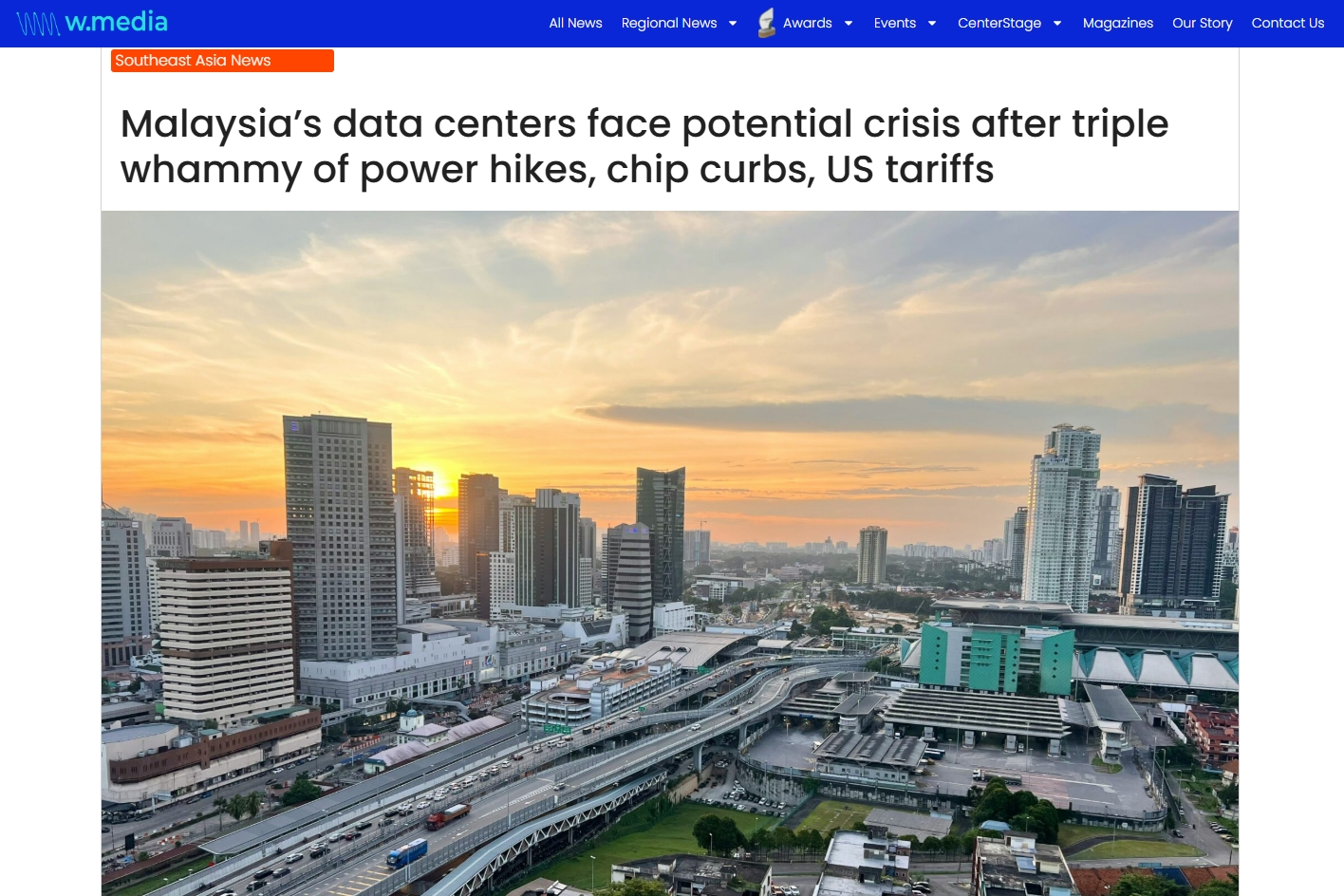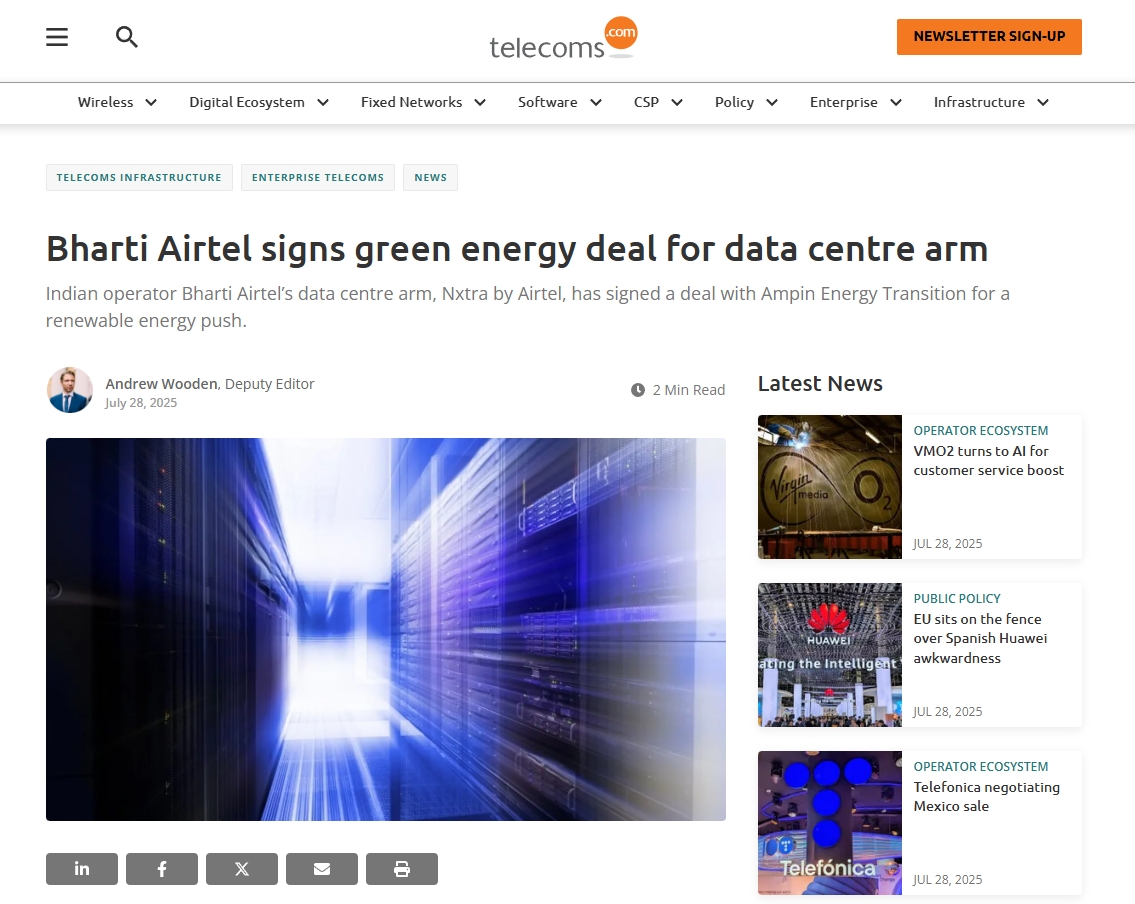Malaysia’s data center industry faces a potential crisis if the triple whammy of hikes in US tariffs, higher power tariffs, and proposed US curbs on access to advanced chips, are not addressed soon, says an industry observer at the sidelines of Johor Interconnect World Forum 2025 which was held on 8th July. The observer, who declined to be named, said that the power rates which were increased from 1 July had the industry worried but when proposed chip curbs were reported followed by higher US tariffs announced on 8 July, fears were heightened that a full-blown crisis would ensue should the issues not be resolved soon enough.
As a result, the industry is scrambling to come up with a united response to the deepening issues plaguing it with plans to incorporate an association to act as the voice of the industry, the forum heard.
“A lot of bad news have hit us recently, the hardest of which so far is the electricity hike which could add a lot more to our operating costs since electricity is the biggest operating cost for data centers,” said an industry veteran. He added that with the Energy Commission so far not coming up with a response, he feared the worst. Some quarters are predicting doom for the industry which had so far enjoyed an unprecedented boom especially in the state of Johor, where a majority of data centers in Malaysia are located. Electricity costs could amount up to 60 per cent of total operating costs, according to industry estimates.
However, some are still optimistic that things would not turn out as bad citing ongoing tariff negotiations between Malaysia and the US, unconfirmed details on the chip curbs as well as possible dialogue with the authorities such as the Energy Commission on the electricity tariffs. The latter might prove a bit more difficult although not impossible, said the observer. With the widespread and rapid increase in adoption of cloud computing and AI, the growth trajectory still remains strong despite these challenges, opined the optimists.
Still, the triple whammy has a chilling effect on the industry overall.
Chip curb uncertainty
Although the restrictions in access to advanced AI chips are not finalized yet, there are fears that this would impede the growth of data centers in Malaysia, as well as Thailand. More than 70 percent of new data center investments in ASEAN (including early stage) will be in Malaysia and Thailand, thus the restriction of access to AIchips could weigh heavily on these two countries as well as the broader data center development in ASEAN, Maybank said in a note.
Noting that it is too early to react to a potential regulation, Gary Goh, founder and director of data centre advisory firm Sprint DC Consulting remarked that there will be more clarity in the weeks to come. “It can be worse than we thought or not as restrictive,” he noted. In terms of the immediate impact, he noted that for data centers under construction, it would be too late to do anything while for sites that have been shortlisted, it would be hard to make a decision.
“For data center operators that have US hyperscalers as customers, the projects would continue unless the contracts are cancelled. Once the detailed rules are unveiled, this would help data center operators who have planned capacity to determine whether to hold back development or not,” he told W. Media when contacted for comment.
Maybank meanwhile is of the view that early stage announcements could be reviewed and companies in the supply chain may experience near-term pressure due to demand uncertainty in the event the curbs are finalised. “The proposal introduces uncertainty for Malaysia and Thailand’s growing roles as an emerging ASEAN/global data center hub,” the bank said.
Tariff talks ongoing
As to US trade tariffs imposed on certain Malaysian exports to the US that are set to be implemented on 1st August, the situation is still in a flux, said Stephen Innes, managing partner of SPI Asset Management, as quoted by Bernama, Malaysia’s national news agency. Innes also referred to US Secretary of State Marco Rubio’s official visit to Kuala Lumpur today for the ASEAN-United States meeting. Many analysts see this as an opportunity for ASEAN to exert some pressure on the US to soften its stance on tariffs. Malaysia, Thailand and Vietnam are the most affected due to their deep integration into US-linked supply chains.
Malaysia has been slapped with a stiff 25% tariff. As of yesterday, tariff negotiations are still ongoing between Malaysia and the US, according to Tengku Datuk Seri Zafrul Abdul Aziz, Malaysia’s Minister of Investment, Trade and Industry, as quoted by Bernama.
Meanwhile, the immediate impact of the tariffs, according to Innes would be uncertainty or trade hesitation – “ … firms freeze expansion, capital goes on standby.”
“The tariffs are a power play, using them less as policy and more as poker chips. ASEAN should treat US trade policy like weather – unpredictable, but not unmanageable,” he further said, adding that ASEAN should build redundancy into supply chains. “Stay close to the US private sector as policy might be political, but profits speak loudly.”
Innes added there are three possible outcomes: a further delay; selective application, or full implementation. The latter would risk retaliation, regional fallout, and pressure on emerging markets.
Meanwhile, economist Geoffrey Williams, as quoted by Bernama, said that he believed Senator Rubio would restate the US position and reassure ASEAN that a solution is still available until 1st Aug.








